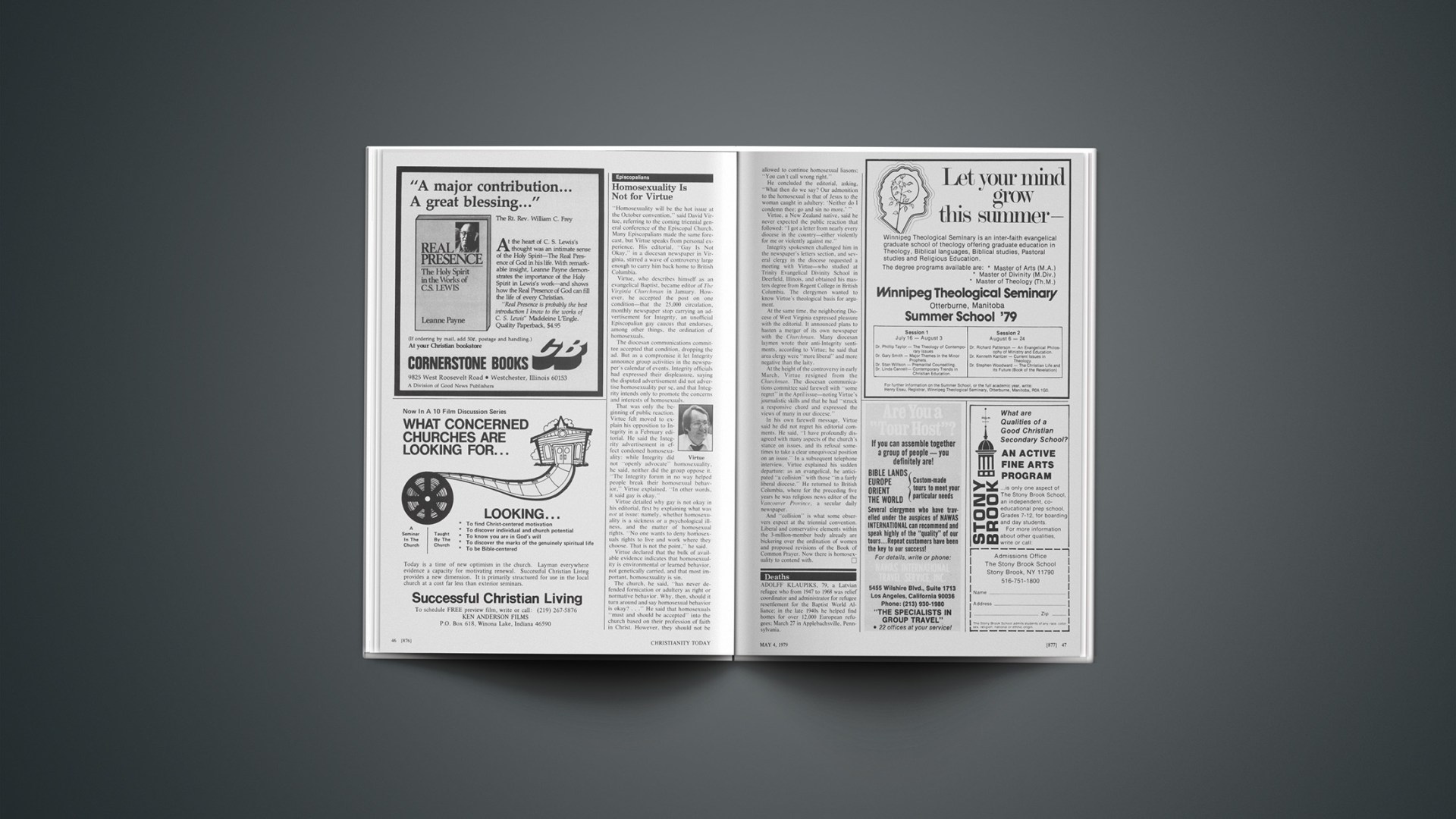“Homosexuality will be the hot issue at the October convention,” said David Virtue, referring to the coming triennial general conference of the Episcopal Church. Many Episcopalians made the same forecast, but Virtue speaks from personal experience. His editorial, “Gay Is Not Okay,” in a diocesan newspaper in Virginia, stirred a wave of controversy large enough to carry him back home to British Columbia.
Virtue, who describes himself as an evangelical Baptist, became editor of The Virginia Churchman in January. However, he accepted the post on one condition—that the 25,000 circulation, monthly newspaper stop carrying an advertisement for Integrity, an unofficial Episcopalian gay caucus that endorses, among other things, the ordination of homosexuals.
The diocesan communications committee accepted that condition, dropping the ad. But as a compromise it let Integrity announce group activities in the newspaper’s calendar of events. Integrity officials had expressed their displeasure, saying the disputed advertisement did not advertise homosexuality per se, and that Integrity intends only to promote the concerns and interests of homosexuals.
That was only the beginning of public reaction. Virtue felt moved to explain his opposition to Integrity in a February editorial. He said the Integrity advertisement in effect condoned homosexuality: while Integrity did not “openly advocate” homosexuality, he said, neither did the group oppose it. “The Integrity forum in no way helped people break their homosexual behavior,” Virtue explained. “In other words, it said gay is okay.”
Virtue detailed why gay is not okay in his editorial, first by explaining what was not at issue: namely, whether homosexuality is a sickness or a psychological illness, and the matter of homosexual rights. “No one wants to deny homosexuals rights to live and work where they choose. That is not the point,” he said.
Virtue declared that the bulk of available evidence indicates that homosexuality is environmental or learned behavior, not genetically carried, and that most important, homosexuality is sin.
The church, he said, “has never defended fornication or adultery as right or normative behavior. Why, then, should it turn around and say homosexual behavior is okay?…” He said that homosexuals “must and should be accepted” into the church based on their profession of faith in Christ. However, they should not be allowed to continue homosexual liasons: “You can’t call wrong right.”
He concluded the editorial, asking, “What then do we say? Our admonition to the homosexual is that of Jesus to the woman caught in adultery: ‘Neither do I condemn thee; go and sin no more.’ ”
Virtue, a New Zealand native, said he never expected the public reaction that followed: “I got a letter from nearly every diocese in the country—either violently for me or violently against me.”
Integrity spokesmen challenged him in the newspaper’s letters section, and several clergy in the diocese requested a meeting with Virtue—who studied at Trinity Evangelical Divinity School in Deerfield, Illinois, and obtained his masters degree from Regent College in British Columbia. The clergymen wanted to know Virtue’s theological basis for argument.
At the same time, the neighboring Diocese of West Virginia expressed pleasure with the editorial. It announced plans to hasten a merger of its own newspaper with the Churchman. Many diocesan laymen wrote their anti-Integrity sentiments, according to Virtue; he said that area clergy were “more liberal” and more negative than the laity.
At the height of the controversy in early March, Virtue resigned from the Churchman. The diocesan communications committee said farewell with “some regret” in the April issue—noting Virtue’s journalistic skills and that he had “struck a responsive chord and expressed the views of many in our diocese.”
In his own farewell message, Virtue said he did not regret his editorial comments. He said, “I have profoundly disagreed with many aspects of the church’s stance on issues, and its refusal sometimes to take a clear unequivocal position on an issue.” In a subsequent telephone interview, Virtue explained his sudden departure: as an evangelical, he anticipated “a collision” with those “in a fairly liberal diocese.” He returned to British Columbia, where for the preceding five years he was religious news editor of the Vancouver Province, a secular daily newspaper.
And “collision” is what some observers expect at the triennial convention. Liberal and conservative elements within the 3-million-member body already are bickering over the ordination of women and proposed revisions of the Book of Common Prayer. Now there is homosexuality to contend with.










